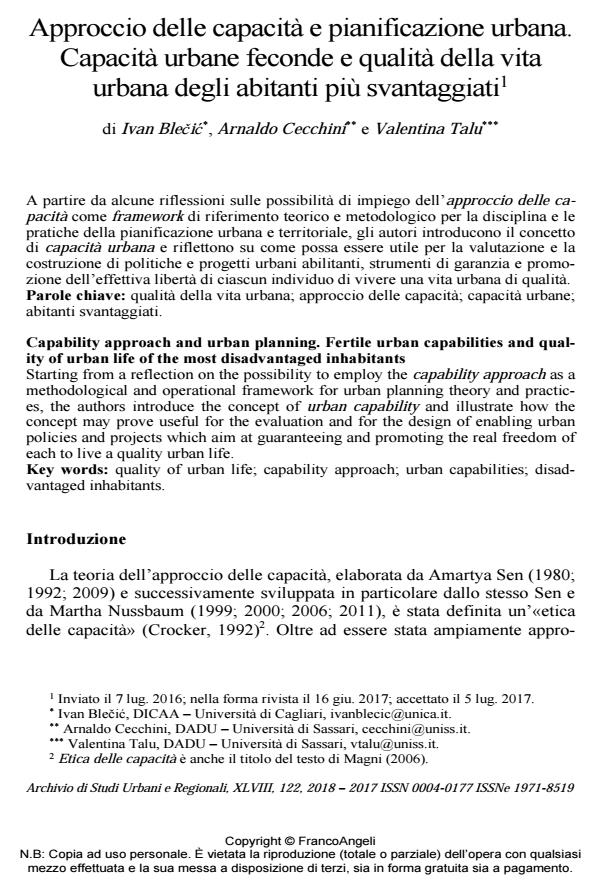Approccio delle capacità e pianificazione urbana. Capacità urbane feconde e qualità della vita urbana degli abitanti più svantaggiati
Titolo Rivista ARCHIVIO DI STUDI URBANI E REGIONALI
Autori/Curatori Ivan Blecic, Arnaldo Cecchini, Valentina Talu
Anno di pubblicazione 2018 Fascicolo 2018/122
Lingua Italiano Numero pagine 19 P. 34-52 Dimensione file 214 KB
DOI 10.3280/ASUR2018-122003
Il DOI è il codice a barre della proprietà intellettuale: per saperne di più
clicca qui
Qui sotto puoi vedere in anteprima la prima pagina di questo articolo.
Se questo articolo ti interessa, lo puoi acquistare (e scaricare in formato pdf) seguendo le facili indicazioni per acquistare il download credit. Acquista Download Credits per scaricare questo Articolo in formato PDF

FrancoAngeli è membro della Publishers International Linking Association, Inc (PILA)associazione indipendente e non profit per facilitare (attraverso i servizi tecnologici implementati da CrossRef.org) l’accesso degli studiosi ai contenuti digitali nelle pubblicazioni professionali e scientifiche
A partire da alcune riflessioni sulle possibilità di impiego dell’approccio delle ca-pacità come framework di riferimento teorico e metodologico per la disciplina e le pratiche della pianificazione urbana e territoriale, gli autori introducono il concetto di capacità urbana e riflettono su come possa essere utile per la valutazione e la costruzione di politiche e progetti urbani abilitanti, strumenti di garanzia e promo-zione dell’effettiva libertà di ciascun individuo di vivere una vita urbana di qualità.
Parole chiave:Qualità della vita urbana; approccio delle capacità; capacità urbane; abitanti svantaggiati.
- Capabilities, Learning, and Urban Quality of Life Arianna Luisa Cavaliere, pp.1 (ISBN:978-3-658-49430-8)
- Computational Science and Its Applications – ICCSA 2019 Ivan Blečić, Alessandra G. Santos, Ana Clara Moura, Giuseppe A. Trunfio, pp.612 (ISBN:978-3-030-24301-2)
- Capabilities, Learning, and Urban Quality of Life Arianna Luisa Cavaliere, pp.259 (ISBN:978-3-658-49430-8)
- Computational Science and Its Applications – ICCSA 2025 Workshops Ivan Blečić, Alessandro Floris, Giulia Giliberto, Giuseppe A. Trunfio, pp.341 (ISBN:978-3-031-97605-6)
- Mobility Policies and Extra-Small Projects for Improving Mobility of People with Autism Spectrum Disorder Arnaldo Cecchini, Tanja Congiu, Valentina Talu, Giulia Tola, in Sustainability /2018 pp.3256
DOI: 10.3390/su10093256 - Computational Science and Its Applications – ICCSA 2024 Workshops Becchio Cristina, Bottaccioli Lorenzo, Bottero Marta, Cavana Giulio, Fancello Giovanna, Sciullo Alessandro, pp.207 (ISBN:978-3-031-65307-0)
- Capabilities, Learning, and Urban Quality of Life Arianna Luisa Cavaliere, pp.95 (ISBN:978-3-658-49430-8)
- Capabilities, Learning, and Urban Quality of Life Arianna Luisa Cavaliere, pp.9 (ISBN:978-3-658-49430-8)
Ivan Blecic, Arnaldo Cecchini, Valentina Talu, Approccio delle capacità e pianificazione urbana. Capacità urbane feconde e qualità della vita urbana degli abitanti più svantaggiati in "ARCHIVIO DI STUDI URBANI E REGIONALI" 122/2018, pp 34-52, DOI: 10.3280/ASUR2018-122003